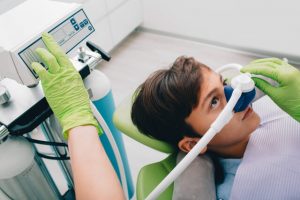What does happy gas do with dental patients? Does it make them happy, or do they laugh after inhaling the gas? Are you that curious? Then, come and join me. You only have to visit this link, and then we can find more information about it.
What is a happy gas?
Have you heard about a happy gas? Well, if not, you are just in the right corner to find out.
Happy gas is the Nitrous oxide (N2O) or commonly known as the laughing gas. They also call it the dinitrogen monoxide. It is present in the atmosphere where it acts as a greenhouse gas, with a powerful effect.
They call the nitrous oxide as the happy gas or laughing gas because of its intoxicating effects upon inhalation. The dentists use nitrous oxide as a sedative to relax a dental patient. The patient will start to inhale it through a mask that fits over the nose.
On the positive side, the laughing gas is colorless and odourless. Additionally, it gives pleasurable feelings to dental patients. This way, it is easier for the dentists to proceed with the dental procedures. In this case, they considered nitrous oxide as a safe method to relax dental patients with anxiety.
Due to its euphoric effects, nitrous oxide has made its way inside the World Health Organization’s List of Essential Medicines. The laughing gas is one of the safest and most effective medicines needed in a health system.
 Unlike general anesthesia, the happy gas will not put you to sleep. It will only decrease your awareness and sensation while the dental procedure is ongoing. It helps you become tolerable with the pain from the injection or the procedure itself that can cause discomfort.
Unlike general anesthesia, the happy gas will not put you to sleep. It will only decrease your awareness and sensation while the dental procedure is ongoing. It helps you become tolerable with the pain from the injection or the procedure itself that can cause discomfort.
However, even though they call it the laughing gas, we cannot disregard the fact that it also contains side effects.
Side effects of nitrous oxide
The trusted dentists from Parramatta Green Dental warns that this gas is not all fun and games. It has limits. However, they have proven that only a few patients are experiencing adverse side effects. The side effects occur either if the level of the laughing gas is too high or if the amount of the inhaled gas rapidly changes during the inhalation.
We got you a few of the potential side effects that you may encounter after the inhalation of the laughing gas. You may or you may not need to seek medical attention after this.
Short term effects
- Headache
- Shivering
- Excessive sweating
- Dizziness, nausea or vomiting
- Fatigue
- Fever
- Minor breathing problems
As a recommendation, the patient should only eat a light meal and have it for several hours without heavy meals after the procedure. In effect, they can avoid getting stomach issues. The dentist should be keenly observant of the patient’s reaction upon inhaling the gas to prevent complications.
Long term effects (due to overexposure)
- Anemia or Vitamin B-12 deficiency
- Nerve damage
- Seizures
- Increased heart rate
- Difficulty in breathing
- Hallucinations
- Memory loss
- Disorientation or confusion
Sometimes, patients have to receive oxygen for at least five minutes to avoid a headache. Oxygen helps the patient become aware and alert since it purges the remaining happy gas from the lungs. Since it is easy to eliminate this sedation method from the body, the patient can still drive themselves home after the appointment.
Generally speaking, we still have to know that we should use any product or medicine with moderation and proper prescription. There are always limitations and a necessity to control.
Bottom line
The happy gas is a safe sedation method, both for the kids and the adults. But side effects can occur after its use. Although the side effects are mostly minor and do not last long, nitrous oxide can still be dangerous and life-threatening if misused or overused.
It is also important to realize that patients differ with the sedation method applicable to them. It would still be best to have to discuss it with your dentist to avoid complications in the future. Moreover, they need to verify your current health condition first before jumping into the sedation method to use. The dentist can explain other sedation methods if the happy gas does not suit the patient’s current health condition.
Your dentist would be happy to discuss all the details you need to make the procedure successful.


